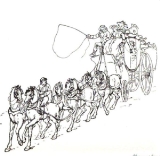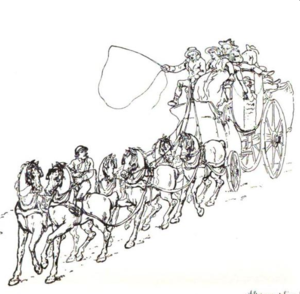
My postillion has been struck by lightning
Encyclopedia

Postilion
A postilion rider was the driver of a horse-drawn coach or post chaise, mounted on one of the drawing horses...
has been struck by lightning", "Our postillion has been struck by lightning", and other variations on the same pattern, are often given as examples of the ridiculous phrases supposed to have been found in phrase book
Phrase book
A phrase book is a collection of ready-made phrases, usually for a foreign language along with a translation, indexed and often in the form of questions and answers.- Structure :...
s or language instruction in the nineteenth and twentieth century. The word postillion may occur in its alternative spelling postilion.
Although various forms of the sentence are widely cited, the exact wording and the context in which it is said to have originally been used vary. For example, a teaching manual attributes it to a Portuguese-English phrasebook: By contrast a linguistics textbook mentions the supposedly "apocryphal" phrase during a description of foreign language teaching in "the schoolrooms of Europe at the close of the nineteenth century":
Origin
The source of the expression is obscure. Despite the quote's alleged nineteenth-century origin, author Nigel ReesNigel Rees
Nigel Rees is an English author and presenter, best known for devising and hosting the Radio 4 long running panel game Quote.....
reports in Brewer's Famous Quotations that he was unable to discover any reference earlier than the 1930s.
However, the August 30, 1916 edition of the British
United Kingdom
The United Kingdom of Great Britain and Northern IrelandIn the United Kingdom and Dependencies, other languages have been officially recognised as legitimate autochthonous languages under the European Charter for Regional or Minority Languages...
magazine Punch
Punch (magazine)
Punch, or the London Charivari was a British weekly magazine of humour and satire established in 1841 by Henry Mayhew and engraver Ebenezer Landells. Historically, it was most influential in the 1840s and 50s, when it helped to coin the term "cartoon" in its modern sense as a humorous illustration...
includes this item: "An officer serving in the Balkans writes to say that he has just come across a Hungarian - English phrase - book which starts with the useful phrase, "My postilion has been struck by lightning."
Another early usage of the phrase occurs in a 1932 book entitled Little Missions, written by "Septimus Despencer": According to its introduction, the travels reported in the book occurred during "[t]he three years following the armistice of 1918": thus Despencer's discovery of the phrase would be dated during the period 1919-1921. In the April 2008 issue of the Quote ... Unquote newsletter, Nigel Rees speculates that the phrase "passed into general circulation" from Despencer's book.
In a 1935 issue of Punch
Punch (magazine)
Punch, or the London Charivari was a British weekly magazine of humour and satire established in 1841 by Henry Mayhew and engraver Ebenezer Landells. Historically, it was most influential in the 1840s and 50s, when it helped to coin the term "cartoon" in its modern sense as a humorous illustration...
magazine, "Look! Our Postillion has been struck by lightning" is said to be "one of the 'Useful Common Phrases' appearing in a Dutch manual on the speaking of English".
Examples of similar phrases do occur in nineteenth century phrase books. The 1870 edition of Baedeker
Baedeker
Verlag Karl Baedeker is a Germany-based publisher and pioneer in the business of worldwide travel guides. The guides, often referred as simply "Baedekers" , contain important introductions, descriptions of buildings, of museum collections, etc., written by the best specialists, and...
's phrasebook gives German, French and Italian equivalents of the sentence "Are the postilions insolent?" The 1877 edition of John Murray
John Murray (publisher)
John Murray is an English publisher, renowned for the authors it has published in its history, including Jane Austen, Sir Arthur Conan Doyle, Lord Byron, Charles Lyell, Johann Wolfgang von Goethe, Herman Melville, and Charles Darwin...
's Handbook of Travel-Talk contains translations of "Oh, dear! The postilion has been thrown (off) down", followed in succession by "Is he hurt? Run for assistance to the nearest cottage", "Ask for a surgeon", "I am afraid that he has broken his leg -- his arm", "He has bruised his head", and finally "He must be carried home gently".
Notable sightings
In James ThurberJames Thurber
James Grover Thurber was an American author, cartoonist and celebrated wit. Thurber was best known for his cartoons and short stories published in The New Yorker magazine.-Life:...
's 1937 New Yorker
The New Yorker
The New Yorker is an American magazine of reportage, commentary, criticism, essays, fiction, satire, cartoons and poetry published by Condé Nast...
article "There's No Place Like Home", a phrasebook from "the era of Imperial Russia" contains the "magnificent" line: "Oh, dear, our postillion has been struck by lightning!". Thurber speculates that such a "fantastic piece of disaster" must have been rare, "even in the days of the Czars". Thurber heard of the quote from "an writer in a London magazine".
"The Postilion Has Been Struck By Lightning" is the title of a two-stanza poem by Patricia Beer
Patricia Beer
Patricia Beer was an English poet and critic.She was born in Exmouth, Devon into a family of Plymouth Brethren. She moved away from her religious background as a young adult, becoming a teacher and academic...
, published in 1967. The poem was later selected for inclusion in The Oxford Book of Contemporary Verse. In it, the author laments the death in a thunderstorm of "the best postilion I ever had".
In 1977 actor Dirk Bogarde
Dirk Bogarde
Sir Dirk Bogarde was an English actor and novelist. Initially a matinee idol in such films as Doctor in the House and other Rank Organisation pictures, Bogarde later acted in art-house films such as Death in Venice...
made use of the phrase when he titled the first volume of his autobiography A Postillion Struck By Lightning. According to Nigel Rees, Bogarde explains that while on a childhood vacation (presumably in the 1920s) he discovered an old phrase book, seemingly dating from 1898. The phrase book contained such sentences as "The muslin is too thin, have you something thicker?", "My leg, arm, foot, elbow, nose, finger is broken" and "The postillion has been struck by lightning".
In a 1995 paper, linguist David Crystal
David Crystal
David Crystal OBE FLSW FBA is a linguist, academic and author.-Background and career:Crystal was born in Lisburn, Northern Ireland. He grew up in Holyhead, North Wales, and Liverpool, England where he attended St Mary's College from 1951....
defined "postilion sentences" as "sentences introduced in teaching [that] seem to have little or no chance of ever being used in real life". They are named after the phrase "The postilion has been struck by lightning", which Crystal describes as a famous example of such a sentence. He goes on to suggest that "an unexpectedly large number of sentences, used routinely with children with language impairment, are of this type", and gives as examples "That table's got four legs", and "Clap (your) hands!". He concludes that, "if teaching and therapeutic time is to be truly efficacious", postilion sentences should be avoided.

